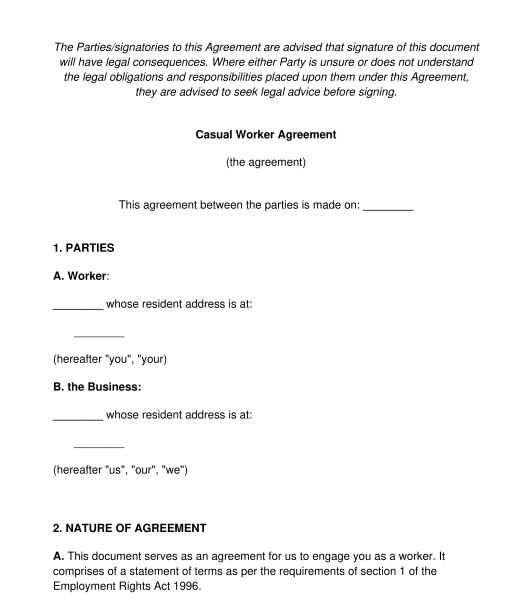 04/11/2025
04/11/2025

Answer a few questions and your document is created automatically.

Your document is ready! You will receive it in Word and PDF formats. You will be able to modify it.

 04/11/2025
04/11/2025
 Word and PDF
Word and PDF
 5 to 7 pages
5 to 7 pages
A casual worker agreement is a contract used to hire an individual who will be given work as and when an employer requires them to work. The casual worker is usually hired on a short-term or irregular basis, with their working hours varying significantly depending on the employer's needs.
A casual worker agreement is a contract that is used to hire an individual who will be working on an irregular or short-term basis. The casual worker agreement does not guarantee regular working hours. Under the casual worker agreement the employer has no obligation to offer work to the worker while the worker has no obligation to accept the work.
An employment agreement is a contract that is used to hire an individual who will be working on a regular basis for either a fixed time (under a fixed-term contract) or a continuous period. Under an employment contract, the employee is assured of work for the contracted period of time and will have access to more statutory rights such as holiday pay, sick leave and other statutory benefits. The employee is also obligated to accept and perform the work given to them by the employer.
Unlike a casual worker agreement, under a service contract, the client hires an independent contractor who is self employed. The contractor also has the option to carry out the services through a personal service company. The contractor must carry out the work that is assigned in the service contract, and failure to do this could amount to a breach of the contract. The contractor has no employment statutory protections and is responsible for their own costs, tax, and other expenses.
No, it is not mandatory to have a written casual worker agreement. However, it is highly recommended to have one in place. In the UK, casual workers are also entitled to have a written agreement. This is because of there is a difference between a casual worker and an employee, so it will be important to have a written contract that reflects these differences so as to reduce the risk of confusion.
The following are not permitted in a casual worker agreement:
The parties to a casual worker agreement will be the employer and the casual worker.
The employer can be any business structure, such as:
The casual worker will be an individual. The minimum age for full-time work of 16 years old will continue to apply for a casual worker agreement. Once the employee reaches 18 years old, they will be entitled to adult employment rights and rules.
There is no rule concerning the maximum duration of a casual worker agreement. Nonetheless, a casual worker relationship is generally short-term, flexible, and has irregular working hours. If a casual worker is engaged for an extended period of time with regular working hours/engagements, this may cause them to be treated as an employee and change the nature of the relationship in practice.
Two copies of the casual worker agreement should be provided to the worker and the employee to read and understand. When both parties are happy with the contents of the agreement, they should sign both copies, returning one copy to the other party and keeping the other copy for their own records.
The following documents can be attached to a casual worker agreement:
No, it is not necessary for a casual worker agreement to be witnessed. It only has to be signed by the parties (i.e. the employer and the worker) for it to be duly executed.
A casual worker agreement must contain:
Both parties should consider and be aware of issues including, but not limited to, holiday entitlement, the national minimum wage, the working time directive, statutory sick pay, automatic pensions enrolment, dismissal and discrimination law, although not all of these issues are required to be addressed or considered within the contract.
Key legal provisions include:
You fill out a form. The document is created before your eyes as you respond to the questions.
At the end, you receive it in Word and PDF formats. You can modify it and reuse it.
A guide to help you: Signing Documents in England and Wales
Casual Worker Agreement - Template - Word & PDF
Country: United Kingdom